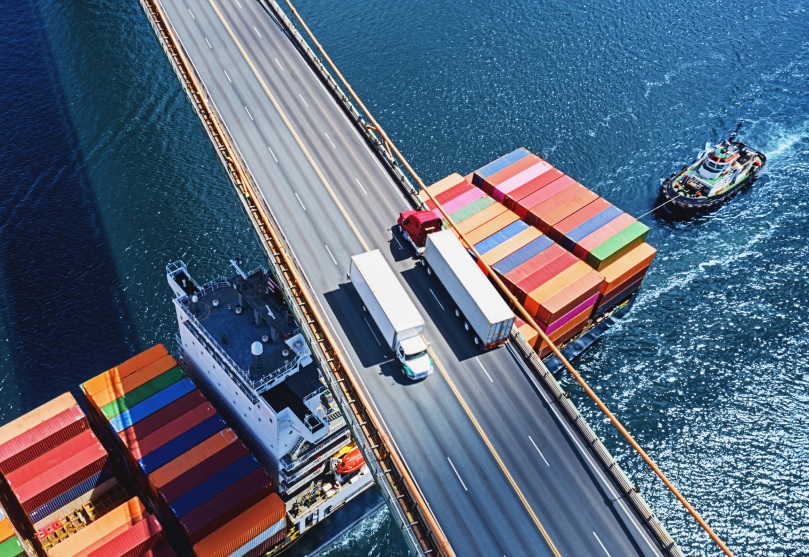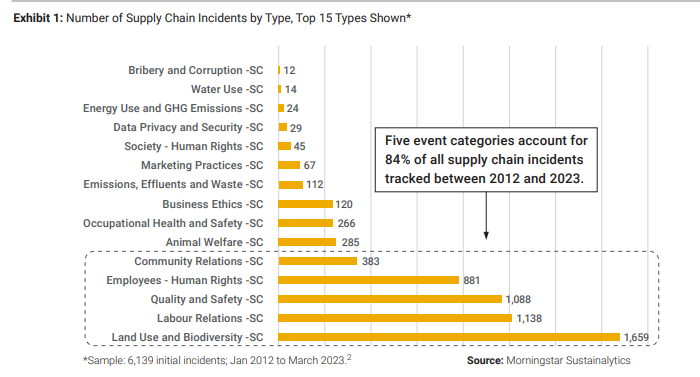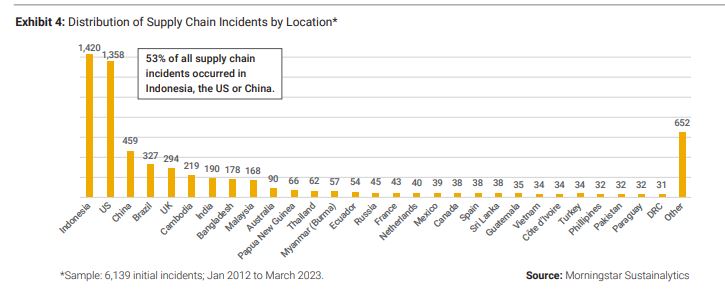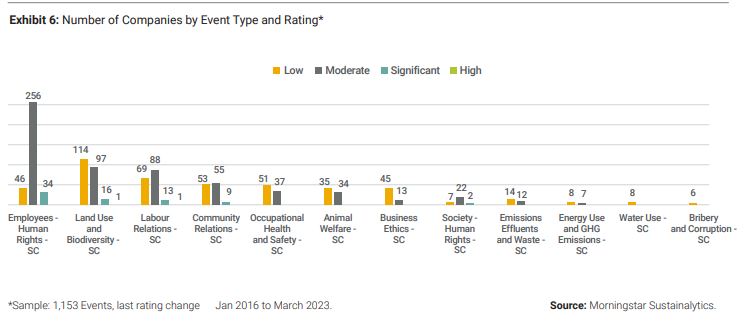
After a record number of supply chain incidents in 2021, Morningstar Sustainalytics sought to isolate and quantify the issues in a recent ESG Spotlight report titled Supply Chain Incidents: Understanding the Impacts.
The first part of a three-part series from Martin Vezér and Poulomi Sengupta assessed a sample of more than 6,000 supply chain incidents, finding that 1,092 occurred in 2021 alone – shining some light on the impact Covid-19 had on crucial supply chains, which sectors are most at risk, and what investors can do about it.
"The Covid-19 pandemic led to supply chain disruptions that illustrate how businesses can face abrupt shortages of key materials, delays in shipments and increased costs when the operating conditions of their suppliers are stifled," the authors noted.
Multinational consumer goods companies, including Amazon [AMZN] and Nestlé [NSRGY], account for more supply chain incidents than firms in other sectors, the authors found, reflecting the complexity of their multi-tiered supply chains.

Supply Chain Incidents Quintuple
While Covid-19 may have caused more incidents, the research found a longer-term trend.
"Over the past decade, we have observed more than a five-fold increase in the number of supply chain incidents recorded each year, from 178 in 2012 to over 1,000 in 2021," the authors said, adding that much of the growth may be due to increased coverage of incidents, as Sustainalytics media sources grew from 20,000 to 70,000 over the same timeframe. Along with increased non-governmental organisation (NGO) reporting, the expanded coverage of ESG incidents could present greater risk for investors.
The report found trends related to NGO activity and geographic incident hotspots.
"Increasing NGO reporting and screening also play a key role: more than half of the cases recorded for 2018 stem from NGO reports that identify supplier impacts relating to land use and biodiversity – SC," the authors note. In terms of geographic trends, Indonesia, the US, and China accounted for more than half of the supply chain incidents in the study sample.
Why is Indonesia Such a Problem?
"The food products and household products industries account for most cases in Indonesia, where land use and biodiversity is a critical issue," the study found.
"Recent research conducted by [the not-for-profit NGO] AidEnvironment provides a pertinent example of how incidents can permeate through multiple supply chains.
"Its analysis found 10 firms were responsible for a total of 8,100 hectares of forest loss in Indonesia in the first half of 2022." In the US, the study found that suppliers in the retailing and food retail industries were most frequently involved in labour controversies.

How Should I Assess Supply Chain Problem Severity?
After identifying the incidents, the report rated the materiality of events by evaluating their social and environmental impacts and the risks they present to the involved companies.
These ratings accounted for a firm's responsiveness, the quality of its relevant management systems, market trends, industry norms and the authors' own outlooks. Some of the more significant events identified by the report include forced labour among Uyghur minorities affecting tech firms and the car manufacturing sector globally. There is also a case of mistreated online fashion store employees in the UK – which was followed by a billion-dollar bust for the company's stock valuation.

What Can Stock Investors Do About Supply Chain Risk?
In terms of handling supply chain risk, the report identifies strategies from investors including divestment and engagement.
"Investors can develop strategies for mitigating portfolio risks by tilting asset allocations in favour of incident-resistant firms or pursuing an incident-driven engagement plan," the authors say.
One way investors can engage companies is via Sustainalytics' thematic engagement service, which supports companies in developing human rights due diligence systems that align with the UN Guiding Principles on Business and Human Rights (UNGPs).
"This offering aims to improve the livelihood of people directly involved in supply chains and address the root causes of human rights risks," the report says.
Next Wednesday, we’ll delve deeper into managing human rights issues related to supply chains in the second report from Sustainalytics







:quality(80)/cloudfront-us-east-1.images.arcpublishing.com/morningstar/6BCTH5O2DVGYHBA4UDPCFNXA7M.png)























